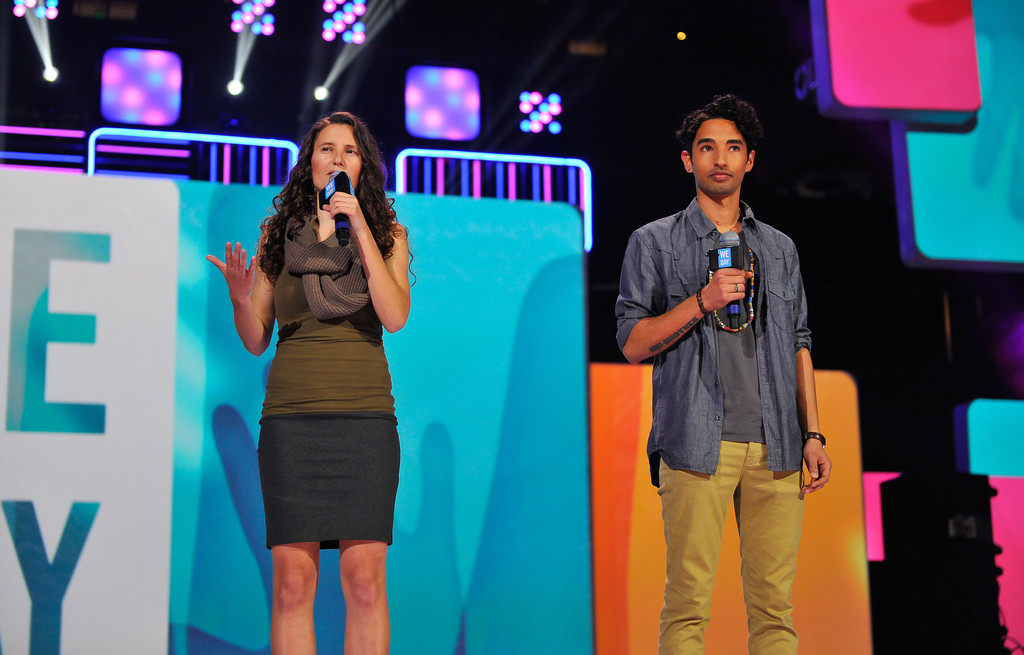Co-founded in 2013 by poets Natasha Huey and Gabriel Cortez, Write Home is a project that facilitates writing workshops and open mics for homeless youth in shelters and service organizations in Berkeley, CA. Through spoken word poetry, youth are able to foster community, express themselves creatively, and develop positive human connections.
Tell me a bit more about Write Home. What is a typical night like holding a writing workshop?
Natasha: Well, Write Home is a writing workshop that Gabe and I started and it was really to create space for homeless youth to tell their stories. Our writing workshops basically look like us walking into the space. We find a spare table or join some folks at the table and start a writing workshop for anyone who is interested. We invite everyone to join us, even if they’ve never written a poem before, even if they’re not interested in poetry or don’t want to write anything down. We start off with a check-in, talk about how they’re doing, take it to a brainstorm where we generate ideas together and talk about a theme, and then we have a writing prompt where we can start with a line that we give folks. Then we just free write and share. It does some powerful things. It gives people an opportunity to share things about themselves and surprise themselves, by what they’re capable of. The stories they have inside of them are told in creative and funny and sometimes heartbreaking ways.
How does poetry and activism intersect in your work? How do you think poetry and art can bring about social change?
Gabriel: A lot of our work is grounded in creating safe spaces for low-income and homeless youth to tell their stories and build community. And a big part of what we do with poetry is the making of the space and creating opportunities for folks to sit across the table from each other, get to know each other, and to say things that they can’t say in other spaces and that’s a part of activism because—how I see the connection—one, if we’re talking about organizing communities, one of the main things we have to do is combat isolation, build community, and know each other in an authentic way. Once a community knows each other it creates greater opportunities for that community to get activated, to get mobilized and to be better grounded and understand what everyone can contribute.
Natasha: There’s a belief that cultural change precedes policy change. Gay marriage being upheld by the supreme court—that could not have been done without the work by activists and artists, trans folks, queer folks of color. That was cultural change that put on the pressure for policy and laws to change. It wasn’t the other way around. Art is integral in changing perceptions and expanding possibilities of our worlds and the people around us. In the idea that no one is disposable, art can highlight the humanity of people and bring people together to witness each other’s humanity. When you’re talking about social change and liberation of all people, you need to humanize everyone and the only true mechanism we have for that is our storytelling and community.
What is the importance of spoken word and how is it different from more traditional, written poetry?
Gabriel: I’d argue that spoken word poetry is one of the oldest artistic traditions. Probably predates the written word. When we’re talking about spoken word, we’re talking about the first storytellers. Folks gathered around, whether it was the table or a fire, and listened. With spoken word poetry, there’s performance. We’ve got plenty of folks that sit down that don’t write anything on the page, but when it comes time to share, they go off. When we’re making a space, we’re saying that that is just as valid and worthy and legit as writing. Spoken word poetry has room for an exchange between the listener and the speaker. It makes room for those urgent stories to speak and breathe. It’s live.
Natasha: Spoken word is accessible. It’s fun. And it’s alive. Those things really help bring out this form of literacy to folks who don’t own that title of literate or poet or don’t feel like they own the title of artist. It puts value to what they’re doing and saying, and that’s exciting. There’s no barriers to spoken word except being able to speak and understand, which can be seen as hefty barriers, but ultimately, it’s for the people and celebrated by the people.
What’s the best advice you have to give to people who want to get started writing?
Natasha: I would say try. Try writing, see what happens. Put ten minutes on the clock and start with the simple phrase “I remember” and see where your pen goes. Just see what happens in 10 minutes. And at the end of it, look back and see if there’s anything that interests you or where you want to dive deeper, and there’s the place to start your next place the next day. Read, listen, and watch. There are places where you can go to open mics and trying out some writing on your own. When you’re ready, share it and get some feedback and guidance from the community.
Gabriel: I encourage folks to grab a 50 cent notebook, something you can hold onto to see your own growth as a writer. Remember that anything can be a poem. A diary—write journals. A list of questions for someone you have never met. A horoscope for yourself. Put pen to page and see where you end up. You start writing about grandma and end up writing a piece about what you ate that morning, that’s fine. Go with it!
For more information, visit:
www.writehome.org,
www.gabrielmcortez.com
www.natashahuey.com.


